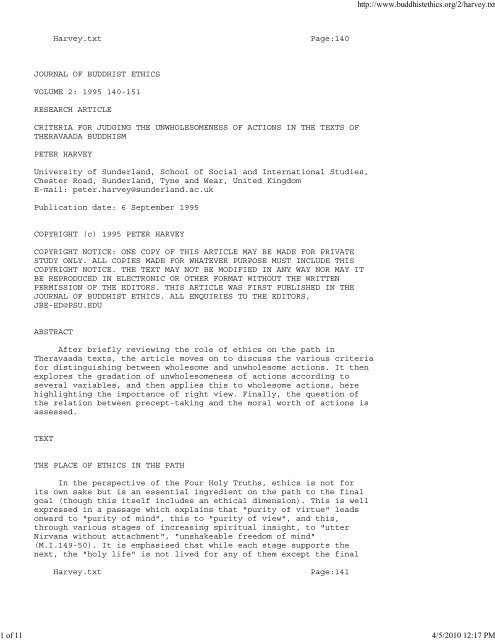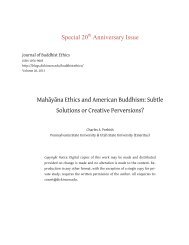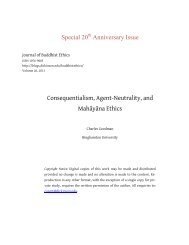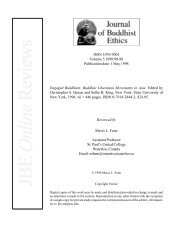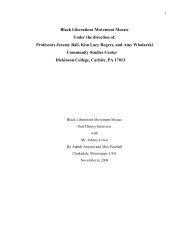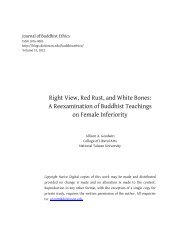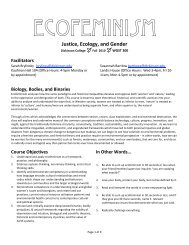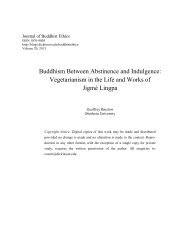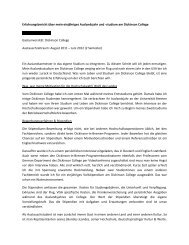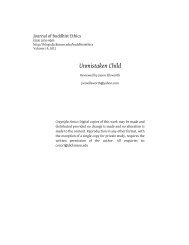Read article - Dickinson Blogs
Read article - Dickinson Blogs
Read article - Dickinson Blogs
Create successful ePaper yourself
Turn your PDF publications into a flip-book with our unique Google optimized e-Paper software.
Harvey.txt Page:140<br />
JOURNAL OF BUDDHIST ETHICS<br />
VOLUME 2: 1995 140-151<br />
RESEARCH ARTICLE<br />
CRITERIA FOR JUDGING THE UNWHOLESOMENESS OF ACTIONS IN THE TEXTS OF<br />
THERAVAADA BUDDHISM<br />
PETER HARVEY<br />
University of Sunderland, School of Social and International Studies,<br />
Chester Road, Sunderland, Tyne and Wear, United Kingdom<br />
E-mail: peter.harvey@sunderland.ac.uk<br />
Publication date: 6 September 1995<br />
COPYRIGHT (c) 1995 PETER HARVEY<br />
COPYRIGHT NOTICE: ONE COPY OF THIS ARTICLE MAY BE MADE FOR PRIVATE<br />
STUDY ONLY. ALL COPIES MADE FOR WHATEVER PURPOSE MUST INCLUDE THIS<br />
COPYRIGHT NOTICE. THE TEXT MAY NOT BE MODIFIED IN ANY WAY NOR MAY IT<br />
BE REPRODUCED IN ELECTRONIC OR OTHER FORMAT WITHOUT THE WRITTEN<br />
PERMISSION OF THE EDITORS. THIS ARTICLE WAS FIRST PUBLISHED IN THE<br />
JOURNAL OF BUDDHIST ETHICS. ALL ENQUIRIES TO THE EDITORS,<br />
JBE-ED@PSU.EDU<br />
ABSTRACT<br />
After briefly reviewing the role of ethics on the path in<br />
Theravaada texts, the <strong>article</strong> moves on to discuss the various criteria<br />
for distinguishing between wholesome and unwholesome actions. It then<br />
explores the gradation of unwholesomeness of actions according to<br />
several variables, and then applies this to wholesome actions, here<br />
highlighting the importance of right view. Finally, the question of<br />
the relation between precept-taking and the moral worth of actions is<br />
assessed.<br />
TEXT<br />
THE PLACE OF ETHICS IN THE PATH<br />
In the perspective of the Four Holy Truths, ethics is not for<br />
its own sake but is an essential ingredient on the path to the final<br />
goal (though this itself includes an ethical dimension). This is well<br />
expressed in a passage which explains that "purity of virtue" leads<br />
onward to "purity of mind", this to "purity of view", and this,<br />
through various stages of increasing spiritual insight, to "utter<br />
Nirvana without attachment", "unshakeable freedom of mind"<br />
(M.I.149-50). It is emphasised that while each stage supports the<br />
next, the "holy life" is not lived for any of them except the final<br />
Harvey.txt Page:141<br />
http://www.buddhistethics.org/2/harvey.txt<br />
1 of 11 4/5/2010 12:17 PM
one. This is because at any lower stage of spiritual progress, there<br />
is still attachment and a person may become complacent, conceited or<br />
arrogant about his or her attainments, thus barring further progress.<br />
The foundational importance of ethics for the rest of the path is,<br />
however, crucial:<br />
So you see, Aananda, wholesome virtues (//kusalaani siilaani//)<br />
have freedom from remorse as object and profit; freedom from<br />
remorse has gladness; gladness has joy; joy has tranquillity;<br />
tranquillity has happiness; happiness has concentration;<br />
concentration has seeing things as they really are; seeing things<br />
as they really are has turning away and non-attachment; turning<br />
away and non-attachment have release by knowing and seeing as<br />
their object and profit. So you see, Aananda, wholesome virtues<br />
lead gradually up to the summit (A.V.2).<br />
In this process of development, the cultivation of one stage<br />
is seen to lead naturally on to the cultivation of the next, so that<br />
the components of the path support one another and interact to form a<br />
harmonious whole. The basis for them all, however, like the earth for<br />
plants or a foundation for a building, is moral virtue (//siila//)<br />
(Miln. 33-4).<br />
"Defilements" such as greed, hatred and delusion are seen to<br />
exist in the form of unwholesome activities of body and speech,<br />
unwholesome thoughts, and the latent tendencies in the mind which are<br />
the root of all these. Moral virtue aims to restrain the external<br />
expression of the defilements, meditation aims to undermine active<br />
defilements in the mind, and liberating insight, facilitated by<br />
meditative calm, aims to destroy defilements in the form of latent<br />
tendencies. These three levels of development can perhaps be seen in<br />
the popular verse:<br />
Not to do any evil,<br />
To cultivate wholesome action,<br />
To purify one's mind--<br />
This is the teaching of the Buddhas (Dhp.183)<br />
CRITERIA OF GOOD AND BAD<br />
Within Buddhism, the most usual way of referring to a good action<br />
is to describe it as //kusala//: "wholesome", in that it involves a<br />
healthy state of mind--stable, pure, unencumbered, ready-to-act, calm<br />
and contented--or "skilful" in producing an uplifting mental state and<br />
spiritual progress in the doer. [1] A "bad" action is //akusala//:<br />
"unwholesome" or "unskilful". The criteria for deciding what action<br />
is "unwholesome" and what is "wholesome" are of three kinds.<br />
The first type of criterion concerns motivation. The three<br />
possible motivating "roots" of "unwholesome" action (M.I.47) are:<br />
i) greed (//lobha//), which covers a range of states from mild<br />
longing up to full-blown lust, avarice, fame-seeking and dogmatic<br />
Harvey.txt Page:142<br />
clinging to ideas; ii) hatred (//dosa//), which covers mild irritation<br />
through to burning resentment and wrath; and iii) delusion (//moha//),<br />
the veiling of truth from oneself, as in dull, foggy states of mind<br />
through to specious doubt on moral and spiritual matters, distorting<br />
the truth, and turning away from the truth.<br />
http://www.buddhistethics.org/2/harvey.txt<br />
2 of 11 4/5/2010 12:17 PM
The opposites of these are the three "roots" of wholesome<br />
action: i) non-greed, covering states from small generous impulses<br />
through to a strong urge for renunciation of worldly pleasures; ii)<br />
non-hatred, covering friendliness through to forbearance in the face<br />
of great provocation, and deep loving kindness and compassion for all<br />
beings; and iii) non-delusion, covering clarity of mind through to the<br />
deepest insight into reality.<br />
While phrased negatively, these three are nevertheless seen as<br />
positive states. The importance of seeing the harmfulness of the<br />
unwholesome roots and the benefit of the wholesome ones is emphasised<br />
in a number of texts. The three roots of the unwholesome are seen as<br />
intertwined. Greed and hatred are grounded in delusion, and greed may<br />
lead to hatred. It is said that greed is a lesser fault, but fades<br />
slowly, hatred is a great fault, but fades quickly, and delusion is a<br />
great fault and fades slowly (A.I.200). This gives a clear indication<br />
of Buddhist values, especially the need to develop wisdom--analytically<br />
directed intuitive insight--so as to overcome delusion. It is also<br />
said that common motives for evil deeds are partiality, enmity,<br />
stupidity and fear (D.III.181-2), and that greed, hatred and delusion<br />
can each lead a person to abusing others with the thought "I am<br />
powerful" (A.I.201-02).<br />
The second type of criterion for what actions are unwholesome<br />
or wholesome concerns the anticipatable direct effect of the action in<br />
terms of causing suffering or happiness. This is shown by a passage<br />
where the Buddha advises that one should reflect before, during and<br />
after any action of body, speech or thought, to consider whether it<br />
might conduce to the harm of oneself, others or both, such that it is<br />
unwholesome and results in //dukkha//. If one sees that it will so<br />
result, one should desist from the action. If one sees that the action<br />
conduces to the harm of neither oneself nor others, nor both, it can<br />
be seen to be wholesome, with a happy result (M.I.415-16). The "harm"<br />
to oneself which is relevant here is spiritual harm, or material harm<br />
if this arises from self-hatred (e.g. by harsh asceticism, M.I.342-9):<br />
an act which benefits others at the expense of material harm to<br />
oneself is certainly not unwholesome. Harm to oneself is also seen to<br />
arise as an immediate result of unwholesome action: "One who is thus<br />
caught up, whose mind is thus infected, in the evil, unwholesome<br />
states born of greed... of hatred... of delusion, experiences<br />
suffering, stress, agitation and anxiety in this present life"<br />
(A.I.202).<br />
The third type of criterion for what is wholesome or<br />
unwholesome builds on the second. It concerns an action's contribution<br />
to spiritual development, culminating in Nirvana. Thus it is said that<br />
unwholesome conduct is that which causes injury, that is, having<br />
//dukkha// as fruit, due to leading to the torment of oneself, others<br />
Harvey.txt Page:143<br />
or both, and conducing to the arising of further unwholesome states<br />
and the diminution of wholesome ones: that is, having unhealthy<br />
effects on the psyche. Wholesome actions are of the opposite kind<br />
(M.II.114-15). Moreover, "wrong directed thought", for example, is<br />
said not only to conduce to the harm of self and other but to be<br />
"destructive of intuitive wisdom, associated with distress, not<br />
conducive to Nirvana", while "right thought" has the opposite effect<br />
(M.I.115-16).<br />
Overall, one can say that an "unwholesome" action is one that<br />
arises from greed, hatred or delusion (or a combination of these),<br />
leads to immediate suffering in others and/or oneself and thus to<br />
http://www.buddhistethics.org/2/harvey.txt<br />
3 of 11 4/5/2010 12:17 PM
further karmic suffering for oneself in the future, and contributes to<br />
more unwholesome states arising and to liberating wisdom being<br />
weakened. "Wholesome" actions have the opposite characteristics. They<br />
arise from a state of mind which is virtuous, as judged by the<br />
action's motive and the agent's knowledge of likely harm or benefit,<br />
its contribution to the improvement of the character of the person who<br />
does it, and thus its assistance in moving a person along the path to<br />
Nirvana.<br />
Using the above criteria, one list of what is "unwholesome"<br />
specifies: i) onslaught on living beings, ii) taking what is not<br />
given, iii) sensual misconduct, iv) lying speech, v) back-biting<br />
speech, vi) harsh speech, vii) empty gossip, viii) covetousness<br />
(//abhijjhaa//), ix) ill-will (//byaapaada//), and x) wrong view<br />
(particularly the view that one should not be held responsible for<br />
ones actions, that actions matter). That is, wrong action of body<br />
(i-iii), speech (iv)-vii) and mind (viii-x). What is wholesome is<br />
restraint (//verama.nii//) from each of these (M.I.47). Such<br />
unwholesome actions are said to be "of unwholesome will<br />
(//akusala-sa~ncetanika//), yielding //dukkha//, ripening in //dukkha//"<br />
(A.V.292). Of these actions, only those relating to body and speech<br />
would normally be seen as coming under the purview of the English<br />
words "morality" or "ethics"; indeed the Pali word //siila//, or<br />
"moral virtue", has a similar range. That which is "wholesome" or<br />
"unwholesome", then, goes beyond purely moral considerations to<br />
include states of mind, which may have no direct effect on other<br />
people. All the factors of the Eightfold Path, for example, are seen<br />
as "wholesome".<br />
INTENTION, KNOWLEDGE AND DEGREES OF UNWHOLESOMENESS IN ACTIONS<br />
The degree of unwholesomeness of an action is seen to vary<br />
according to the degree and nature of the volition/intention<br />
(//cetanaa//) behind the action, and the degree of knowledge (of<br />
various kinds) relating to it. An action becomes more unwholesome as<br />
the force of the volition behind it increases, for this leaves a<br />
greater karmic "trace" on the mind. The Theravaadin commentator<br />
Buddhaghosa discusses the unwholesome act of "onslaught on living<br />
beings" as follows:<br />
"Onslaught on living beings" is, as regards a living being<br />
Harvey.txt Page:144<br />
that one perceives as living, the will to kill it, expressed through<br />
body or speech, occasioning an attack which cuts off its life-faculty.<br />
That action, in regard to those without good qualities (//gu.na//)-animals<br />
etc.--is of lesser fault when they are small, greater fault<br />
when they have a large physical frame. Why? Because of the greater<br />
effort involved; and even where the effort is the same, due to the<br />
greater substance of animal. In regard to those with good qualities-humans<br />
etc.--the action is of lesser fault when they are of few good<br />
qualities, greater fault when they are of many good qualities. But<br />
when size or good qualities are equal, the fault of the action is in<br />
proportion to the intensity of the mental defilements and of the<br />
attack. Five factors are involved: a living being, the actual<br />
perceiving of a living being, a thought of killing, the attack, and<br />
death as a result of it. There are six methods: with one's own hand,<br />
by instigation, by missiles, by contrivance (trap or poison), by<br />
sorcery, by psychic power (M.A.I.198). [2] Here, one can see that an<br />
act is the worse according to the strength and perversity of the<br />
volition motivating and accompanying it. To kill a virtuous human, or<br />
http://www.buddhistethics.org/2/harvey.txt<br />
4 of 11 4/5/2010 12:17 PM
a respect-worthy one such as a parent is particularly perverse<br />
(D.I.85; Vibh.378), just as giving to a virtuous person is<br />
particularly good (A.IV.237-78). That killing in a state of intense<br />
defilement is worse, would mean that premeditated killing, from a mix<br />
of greed, resentment and also delusion, would be very bad.<br />
Other factors which are seen to affect the degree of<br />
unwholesomeness of an action are the degree of both intention and<br />
knowledge involved, and one can outline five levels of unwholesomeness<br />
accordingly:<br />
i) An action performed without intending to do that particular action,<br />
for example accidentally treading on an insect, without any thought of<br />
harming, or doing something when one is insane.<br />
Such an action is not seen as unwholesome, blameworthy or as<br />
generating any bad karmic results. This can be seen from the fact that<br />
it is said that to accidentally crush worms while crushing sugar cane<br />
for its juice is not blameable (Miln.166) though to deliberately kill<br />
any living being is morally blameable. Moreover, there is no offence<br />
for a monk if he kills a living being unintentionally, not realising<br />
that his actions would harm a living being (Vin.IV.125). Likewise, in<br />
the case of the monastic offence--normally entailing defeat in the<br />
monastic life--of deliberately killing a human, "there is no offence<br />
if it was unintentional, if he did not know, if he were not meaning<br />
death, if he was out of his mind..." (Vin.III.78; cf.Vin.II.91).<br />
Again, a monk who breaks a monastic rule when mad does not commit an<br />
offence (Vin.IV.125). What, though, of an act which is not intended to<br />
harm any being, but is such that one knows, or has strong reasons to<br />
expect, that a being or beings will be harmed? For example, crushing<br />
the sugar cane when one knows, or strongly suspects, that it contains<br />
worms? Or driving a car on a hot day when it is very likely that many<br />
insects will be killed? Are these cases of a) culpable carelessness,<br />
or b) simply a lack of extra-mile altruism?<br />
ii) If one knows that a certain kind of action is evil, but does it<br />
Harvey.txt Page:145<br />
when one is not in full control of oneself, for example when drunk or<br />
impassioned.<br />
This is a lesser evil than if one did it with full knowledge<br />
of what one was doing, and with full intention. The //Milindapa~nha//<br />
discusses the case of a Jaataka story (no.433, J.III.514-19) where the<br />
Bodhisattva, as an ascetic, sacrifices (or almost does?) many animals<br />
when a king says that he can marry his beautiful daughter if he does<br />
so (Miln.219-21). The //Milindapa~nha// says that this was an action<br />
done when he was "out of his mind (//visa~n~ninaa//) with passion,<br />
not when he was thinking of what he was doing (//sacetanena//)". The<br />
action was not in accordance with his nature for he was "unhinged,<br />
impassioned. It was when he was out of his mind, thoroughly confused<br />
and agitated that, with thoughts confused, in a turmoil and<br />
disturbed", like a madman. Thus it is said that "Evil done by one who<br />
is unhinged...is not of great blame here and now, nor is it so in<br />
respect of its ripening in a future state". Thus, full insanity<br />
excuses an act, while a temporary "unhinged" state, from passion or<br />
drink, means that there is little moral blame or karmic effect;<br />
getting into such a state can be held to be blameworthy, though.<br />
iii) If one does an evil action when one is unclear or mistaken about<br />
the object affected by the action.<br />
http://www.buddhistethics.org/2/harvey.txt<br />
5 of 11 4/5/2010 12:17 PM
This is moderately blameable. Thus, while it is an offence<br />
requiring expiation for a monk to intentionally kill a living being,<br />
it is a lesser offence, of "wrong-doing", if a) he is in doubt as to<br />
whether it is a living being, or b) if he tries to kill a non-living<br />
thing that he thinks is, or might be, living, for example by shooting<br />
an arrow at it. There is no offence, though, if he fires an arrow at a<br />
living being not knowing that it is a living being (Vin.IV.125). An<br />
attempt to use such reasoning to lessen the evil of an action can be<br />
seen in the actions of the Buddhists of Zanskar, a Kashmiri valley<br />
bordering Tibet, who feel that they have to kill predatory wolves. The<br />
killing is done as indirectly as possible: after luring the wolves<br />
into high-walled stone traps, large stones are thrown over the wall by<br />
a group of people--consequently nobody knows for sure who kills the<br />
animals. In this way, the people seek to put a distance between<br />
themselves and what they see as a practically necessary evil. One<br />
might compare, here, the practice sometimes used in firing squads,<br />
where not everyone's rifle has live ammunition in it, so that no one<br />
actually knows whether they have fired one of the fatal shots!<br />
iv) An evil action done where one intends to do the act, fully knows<br />
what one is doing, and knows that the action is evil.<br />
This is the most obvious kind of wrong action, with bad karmic<br />
results, particularly if it is premeditated.<br />
v) An evil action done where one intends to do the act, fully knows<br />
what one is doing (as in iv), but do not recognize that one is doing<br />
wrong.<br />
This is seen as the worse kind of action. Such an action is<br />
Harvey.txt Page:146<br />
discussed at //Milindapa~nha// 84, which says that if an evil action<br />
is done "unknowingly (//ajaananto//)", it has a worse karmic effect<br />
than if it is done "knowingly". This is illustrated by saying that a<br />
person taking hold of a red-hot iron ball is more severely burnt if<br />
he does so unknowingly. This suggests that an evil action--such as<br />
intentionally killing a living being (Miln.158)--is the worse if it is<br />
done without hesitation, restraint or compunction. This will be the<br />
case if an action is not seen to be wrong, as there will be no<br />
holding back on the volitional force put into the action. On the face<br />
of it, this may seem unjust but perhaps not on further reflection. In<br />
an English court of law, the "ring-leader" of a crime is often<br />
punished more harshly than those who were led on, half-reluctantly.<br />
The leader may well be held to see no wrong in the action--e.g. by<br />
showing no remorse--but the others have some compunction. Relevant to<br />
this is the case of doing a so-called "necessary evil", for example<br />
killing an enemy to prevent one's country being invaded. Here, a<br />
recognition that such an act is still evil is preferable to a glorying<br />
in the act. Indeed, some of the worse crimes of the twentieth century<br />
have been carried out under the banner of an ideology which saw them<br />
as "right" actions: Hitler's Holocaust, Stalin's purges and the Khmer<br />
Rouge's murder of many Cambodians. If one has the wrong view, for<br />
example, that one belongs to the "master race" and that Jews are<br />
"vermin" who should be killed, one is not likely to hold back in one's<br />
evil actions. Here, wrong physical action is both accompanied by and<br />
strengthened by wrong view. [3]<br />
//Milindapa~ha .Tiikaa// 29, on //Milindapa~nha// 158, talks of<br />
the "non-knowing of evil (//paapa-ajaanana//)". Note that in the<br />
monastic discipline, the only viewpoint that a monk can be<br />
disciplined for is the persistent claim, even when admonished, that<br />
http://www.buddhistethics.org/2/harvey.txt<br />
6 of 11 4/5/2010 12:17 PM
what the Buddha calls "stumbling blocks"--namely sense-pleasures--are<br />
no stumbling blocks in the spiritual life (Vin. IV.133-36).<br />
Elsewhere, such an "evil" view is said to generate much badness-power<br />
(//apu~n~na//) (M.I.132). That is, to deny that something<br />
reprehensible is reprehensible is particularly blameworthy.<br />
The above may perhaps be clarified by tabulating what is said<br />
of particular kinds of actions which are unwholesome when<br />
intentionally and knowingly done:<br />
i) ii) iii) iv) v)<br />
One intends to do<br />
a specific act No Min Part Yes Full<br />
or<br />
Yes<br />
One is in a state of<br />
mind in which one knows<br />
one is doing that act No Min Part Yes Yes<br />
One knows the act to<br />
be wrong, if it is<br />
intentionally done Yes Yes Yes Yes No<br />
Harvey.txt Page:147<br />
The act is unwholesome No Min Part Full More<br />
Key:<br />
Min Minimally<br />
Part Partially<br />
Full Fully<br />
More More than normally so<br />
Here, it can be pointed out that there are different kinds of<br />
"ignorance", only some of which excuse an action. If one knows that<br />
sentient beings should not be harmed, but not that one's action is<br />
actually harming one, this "ignorance" as to a matter of ordinary fact<br />
excuses one. The spiritual ignorance which leads one to deny that<br />
harming living beings is wrong is no excuse, however, but compounds a<br />
wrong action. Of course, in Buddhism, lesser degrees of spiritual<br />
ignorance--lack of spiritual insight--are seen to affect all beings<br />
until they are enlightened. This forms a background to all<br />
unenlightened actions, good or bad, though specifically feeds into<br />
wrong actions when they are "rooted" in, that is, motivated by,<br />
delusion: "whatever unwholesome states there are, all are rooted in<br />
spiritual ignorance... are fixed together in spiritual ignorance",<br />
like rafters in a roof-peak (S.II.263). Among other things, spiritual<br />
ignorance feeds the "I am" conceit: the conviction that one has a<br />
permanent, substantial, essential Self to protect and bolster up the<br />
root of selfishness.<br />
It is no coincidence that the Buddha's criticism of people is<br />
not couched in terms of them being evil or sinful, but usually in<br />
terms of them being a "fool". It is said that a person is known as a<br />
"fool" by immoral conduct of body, speech and mind, just as a wise<br />
person is known by moral conduct, and that the fool does not recognise<br />
a transgression for what it is (A.I.102-03), nor to accept another<br />
person's acknowledgement of having committed a transgression (A.I.59).<br />
That is, it is good to see one's own faults and pardon those of<br />
http://www.buddhistethics.org/2/harvey.txt<br />
7 of 11 4/5/2010 12:17 PM
others. Indeed, "a fool who knows he is a fool is to that extent a<br />
wise person; the fool who thinks he is wise is called a fool indeed"<br />
(Dhp.63). Given this, it is clear that one is, for example, doing a<br />
slaughterer a favour if one tries to get him to see that what he is<br />
doing is wrong (though to do so in an aggressive manner is unwholesome<br />
as it is an expression of ill-will). Even if he carries on in his<br />
trade, he is better off if he is at least uneasy about what he is<br />
doing.<br />
Of course, this assumes that there is such a thing as<br />
objectively wrong actions. Only then does it make sense to say that<br />
one could be mistaken in holding something not to be wrong. Given<br />
Buddhism's clear criteria of what is unwholesome action, it is quite<br />
happy to agree to this: an action's "wrongness" subsisting in a<br />
combination of the action itself and the state of mind in which it is<br />
done. It is not a matter of what a person happens to like or dislike<br />
(emotivism), nor of what his society happens to approve or disapprove<br />
of (cultural relativism). [4]<br />
Harvey.txt Page:148<br />
Parallel things to the above could mostly be said for good<br />
actions: i) an unintentionally beneficial action is not to one's<br />
credit; ii) a beneficial action done when one was in a disturbed<br />
state is only of little credit; iii) an action done when one is<br />
unsure there is someone to benefit from it is moderately good;<br />
iv) an intentional good action is straightforwardly good. The parallel<br />
breaks down at v), though: if one thinks that a right action is a<br />
wrong one but still does it, one will do it with compunction, such<br />
that it is a less good action than it would otherwise be. This perhaps<br />
shows the potency of "right view". Indeed, it is said that the thing<br />
which is the greatest cause of the arising or increase of unwholesome<br />
states, and the nonarising or decrease of wholesome states, is wrong<br />
view. It is likewise seen as the greatest cause of rebirth in a<br />
hellish realm. For one of wrong, evil view, whatever deeds of body,<br />
speech or mind "undertaken in complete accord with (that) view,<br />
whatever volitions, aspirations, resolves, activities, all those<br />
states conduce to...suffering" (A.I.31-2; cf. M.III.178-79). The<br />
opposite is said of right view. As a wholesome mental action, right<br />
view is defined as holding that good and bad actions do have results<br />
beyond this life, and that spiritually developed people have knowledge<br />
of such things, wrong view being to deny this:<br />
i) there is gift, there is offering, there is sacrifice;<br />
ii) there is fruit and ripening of deeds well done or ill done;<br />
iii) there is this world, there is a world beyond; iv) there is<br />
mother and father; v) there are spontaneously arising beings;<br />
vi) there are in this world ascetics and brahmins who are faring<br />
rightly, practising rightly, and who proclaim this world and the<br />
world beyond having realized them by their own super-knowledge<br />
(M.III.72, numbers added).<br />
A partial "good" parallel to v) would be doing a truly good<br />
action even though others say it is a bad one. Here, great<br />
determination is needed, so the action can be seen as a very good one.<br />
Another partial parallel is where a young child does a good action<br />
even though he or she has not been told it is "good". An example,<br />
here, is given at Asl.103. A young boy is told to catch a hare to feed<br />
as medicine for his sick mother; he could not do so, though, for he<br />
intuitively recognized that it was wrong to kill.<br />
http://www.buddhistethics.org/2/harvey.txt<br />
8 of 11 4/5/2010 12:17 PM
PRECEPT-TAKING AND MORALITY<br />
This raises the question, though, of whether it is worse to do<br />
an unwholesome action when i) one has formally undertaken not to do<br />
so, or ii) when one has not so undertaken. If one undertakes the<br />
precept of not stealing, this must be because one recognises that such<br />
an action is unwholesome. If one then breaks the precept, while one<br />
does not do so in ignorance of what is right and wrong (as in v),<br />
above), one is also breaking a promise: not to steal. Unless this is a<br />
premeditated lie, though, it perhaps does not outweigh the goodness of<br />
the original promise/resolution to avoid stealing. As expressed by<br />
Tatz, "To act morally in accordance with a vow is considered more<br />
beneficial than to act morally without one, because the moral conduct<br />
Harvey.txt Page:149<br />
is associated with progress toward a higher goal". [5] To break a<br />
moral precept which one is generally seeking, and succeeding, to<br />
follow, would thus be better than to go against one that one has not<br />
formally undertaken.<br />
What, though, of the many monastic rules undertaken by a monk<br />
or nun, but not by a lay-person? The most obvious one of these is the<br />
avoidance of all sexual activity. Sexual activity is acceptable for a<br />
lay-person, provided it is within certain moral bounds. A monk<br />
undertakes to avoid it, as a crucial part of his training to overcome<br />
all greed/attachment, hatred and delusion. Any act of sexual<br />
intercourse will then lead to "defeat" in the monastic life, and<br />
expulsion from it. In this case, it is seen as better not to take the<br />
relevant precept, by remaining a lay-person, or disrobing, than to<br />
take it and then break it. This is partly because of the solemnity of<br />
the monastic vows, and the obligation a monk has to make himself<br />
worthy of the alms of the lay-people who support him, and so not<br />
betray their faith. One could also say that sexual activity is not<br />
itself immoral, so it only becomes blameworthy if indulged in after<br />
vowing not to do so (or if done in a way involving suffering to<br />
others). Here, a useful distinction is made by Asa"nga: between the ten<br />
unwholesome courses of action (above), which are "reprehensible by<br />
nature", and most of the monastic rules, which are "reprehensibly only<br />
'by precept'", as breaking them brings no direct harm to others. [6]<br />
Likewise, the //Abhidharma-Ko"sa// (IV.122bc) says that some things<br />
are not immoral, //dauh"siilya//, but are prohibited by the Buddha for<br />
monks, for example eating after noon.<br />
Another potentially problematic issue is the case, for<br />
example, of a person who steals so as to feed his starving mother.<br />
This would be seen as an act which is a mixture of bad and good, in<br />
which the good aspect helps counterbalance the bad, especially if the<br />
theft is done in recognition of the wrongness of stealing. Buddhism<br />
acknowledges that poverty in a society makes theft more likely<br />
(D.I.76-7). While poverty does not excuse theft, it can be seen to<br />
make it less blameable.<br />
CONCLUSIONS<br />
The perspective of early Buddhism views morality as part of a<br />
spiritual path which largely consists of cultivating a more wholesome<br />
character: by undermining moral/spiritual defilements and cultivating<br />
counteractive virtues. This process of--generally gradual-transformation<br />
is seen to culminate in a state of liberation from all<br />
traces of greed/attachment, hatred and delusion, and their consequent<br />
suffering, through the experience of Nirvana. Such a vision assumes<br />
http://www.buddhistethics.org/2/harvey.txt<br />
9 of 11 4/5/2010 12:17 PM
that people have no fixed, unchanging Self, but are capable of<br />
radical transformation, brought about by attention to the nature of<br />
one's mind and actions.<br />
Attention is given to actions out of a concern for: a) the<br />
happiness/unhappiness that actions directly bring to the agent and<br />
others; b) moral praise and blame, or sanctions within a monastic<br />
Harvey.txt Page:150<br />
community; c) contribution to spiritual development, or its opposite;<br />
and d) the natural karmic effects that are seen to arise, in the<br />
future, for the agent.<br />
All of this entails that what one does, and how and why one<br />
does it, is of great import: for one's actions both express and shape<br />
one's character, and contribute to one's destiny. Much emphasis is put<br />
on the state of mind, and intention, lying behind any action--yet some<br />
actions are identified as always unwholesome to some degree, dependent<br />
on precise motivation. Consequently, it is good to not only seek to<br />
avoid such actions, but to formally vow to avoid them.<br />
Criteria are spelled out to identify, in as objective a way as<br />
possible, which action-intentions should be recognised as morally<br />
unwholesome or wholesome. In this, ignorance of ordinary matters of<br />
fact is seen as excusing what might otherwise be seen as an<br />
unwholesome action, but moral/spiritual ignorance is seen as<br />
compounding an action's unwholesomeness. That is, to perform an<br />
unwholesome action while claiming or regarding it as acceptable or<br />
wholesome is seen to be particularly perverse. In other words, it is<br />
held that some action-intentions--primarily those that deliberately<br />
cause harm to a sentient being--are wrong, and that it is wrong to<br />
deny this and to act on this denial, or from moral blindness.<br />
Such moral objectivism is derived from: a) the notion that we<br />
all have a natural sympathy for the plight of others, however much we<br />
try to ignore, or bury it; b) acting in accord with, and<br />
strengthening, this sympathy naturally leads to more happiness and<br />
less suffering for oneself and those one interacts with; c) no<br />
substantial, permanent Self or I exists, and actions selfishly rooted<br />
in the I-view or -attitude are out of accord with reality, so as to be<br />
both morally unwholesome and naturally productive of unpleasant karmic<br />
result.<br />
Of course, for Buddhism, an act is seen to have unpleasant<br />
karmic results because it is wrong; it is not seen as "wrong" because<br />
it happens to produce bad karmic results. A final point is that it is<br />
better to do a wrong action with compunction than without compunction<br />
(though subsequent guilt-trips are not encouraged, as they lead to an<br />
agitated, beclouded mind-state). Moreover, a key aid to moral<br />
development is the formal avowal of certain moral precepts, which are<br />
seen to strengthen one's moral vision and help to increase the<br />
momentum of moral development. In other words, it helps to have some<br />
moral "aims and objectives" that one agrees with and can happily<br />
affirm, even if one is not always so good at achieving them!<br />
NOTES<br />
[1]. P.A. Payutto, _Good, Evil and Beyond: Kamma in the Buddha's<br />
Teachings_ (Bangkok: Buddhadhamma Foundation, 1993): 19.<br />
[2]. E. Conze, _Buddhist Scriptures_ (Harmondsworth: Penguin, 1959);<br />
http://www.buddhistethics.org/2/harvey.txt<br />
10 of 11 4/5/2010 12:17 PM
cf. Khp.A.28-31.<br />
Harvey.txt Page:151<br />
[3]. Cf. Payutto, _Good, Evil and Beyond: Kamma in the Buddha's<br />
Teachings_: 62-65.<br />
[4]. D. Keown, _The Nature of Buddhist Ethics_ (London: Macmillan,<br />
1992): 64 & 231-232.<br />
[5]. M. Tatz, "Asa"nga's Chapter on Ethics", _Studies in Asian Thought<br />
and Religion_, Volume 4 (Lewiston/Queenston: Edwin Mellen, 1986): 13; On<br />
vows (//sa.mvara//), see //Abhidharma-Ko"sa// 4: 43-51.<br />
[6]. Tatz, "Asa"nga's Chapter on Ethics": 10.<br />
http://www.buddhistethics.org/2/harvey.txt<br />
11 of 11 4/5/2010 12:17 PM


